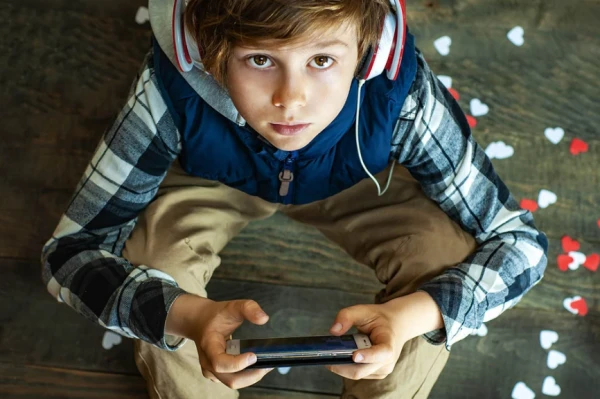
Young people flee to the virtual world from the criminal indifference of adults.
Game addiction - ranging from computer games (not for money) to various forms of gambling, as well as card games and sports betting - has become a real disease of our time. Young people get hooked on games like a drug addict on a needle. That’s why I was so scared for my daughter: she is 11 years old and is already playing under the covers instead of sleeping. Right now, it’s still easy to take her phone away. But what will happen when she turns 14-16 years old?
- Gaming disorder occurs in all age groups, but international studies consistently show increased vulnerability among adolescents and young adults (usually this category includes people aged 19 to 25-29 years, - Ed.). When it comes to addiction to computer games, it is more often teenagers. As for gambling addiction, it is more prevalent among young adults, - says Ruslan Isaev, psychiatrist, narcologist, and head of the psychiatric and narcological clinic of Dr. Isaev.
The expert notes: this is related not so much to the "behavior of the generation" as to the peculiarities of brain development.
- Adolescents have not yet completed the formation of the prefrontal cortex - the area responsible for impulse control, the ability to plan, and assess consequences. That’s why they get "stuck" in games more easily, especially if those games provide quick and vivid bursts of pleasure and help them escape from anxiety or boredom. Although in our practice, we often encounter successful adults who have fallen prey to gambling, - continues Ruslan Isaev.
According to research, between 6 to 9% of teenagers and 2-3% of adults suffer from gaming addiction. And we are not just talking about "casual gamers." We are talking about people for whom gaming has become the main life necessity, displacing all other interests.
- For teenagers, this process is particularly acute and destructive. The reason is that it is during adolescence that personality, social skills, responsibility, and the ability to build relationships are formed. When a teenager retreats into a game, this stage of development seems to be "frozen." They lose the live experience of communicating with peers, sports and creative hobbies, and the skills to overcome difficulties in real life, - says Ruslan Isaev.
Mikhail is 19 years old (the names of all the characters in the publication have been changed at their request, - Ed.). He graduated from college with a legal focus. For the last five years, he has been passionate about computer games. He is currently not studying or working. He plays. Mainly in the evenings and at night, and sleeps during the day.
- Games are a very important part of my life. I tried to do something else: I went to boxing, swimming, signed up for various clubs, but it didn’t work out, - Mikhail tells me. - I didn’t really make friends at school. I have one friend from college, we still communicate, but now online - we play together. In reality, I find it difficult to meet new people and don’t really want to socialize. But in the virtual world, there is a ground for communication, and it turns out to be more interesting; you find like-minded people.
At the same time, Misha does not recognize his gaming addiction. He believes that if he wanted to, he could "quit."
-
Don’t you feel like you’re wasting your life in the virtual world? - I ask.
-
No. I don’t see a problem with that. Right now, I mainly play Minecraft (a computer game where the participant creates their own world from blocks, - Ed.). I develop creative thinking, learn to create beautiful things there. I don’t gamble with money. My relationship with my parents is normal now. Following my father’s advice, I am looking for a job as a typist or courier; I want to do something very simple and spend the rest of the time still playing games.
Schoolboy Igor became a victim of fanfiction (from the English fan fiction - "fan reading"). This is the name for amateur writing based on popular literary works - an alternative story about the adventures of already known characters. It can be a continuation, a spin-off, or a prequel to a popular book, movie, or comic. This is also a form of gaming.
- Igor was a healthy, smart, handsome boy, very developed for his age, the best in his class academically, - his aunt told me. - Everything happened during COVID when schools went online. Igor got hooked on fanfiction; it just sucked him in. And when in-person classes resumed, he simply didn’t show up for school for the first few days. He practically didn’t sleep, didn’t wash, didn’t eat, only wrote fanfiction. And when his mother tried to pull him away from it, he would just become furious. His academic performance dropped sharply. He became completely dependent.
And then... One day, Igor took his own life. Relatives claim that his addiction was to blame. The boy was only 13 years old.
Doctors explain that gambling addiction is a severe complex mental disorder. It usually does not arise in a vacuum and often coexists with other pathologies. The extreme stage of gambling addiction is ludomania (gambling addiction).
Denis is 29 years old. When he turned 15, doctors shocked his parents with the diagnosis: the boy has schizophrenia.
-
On this basis, he is prone to various addictions, including gambling addiction. He got hooked through the Internet. If you have even a slight interest in sports, you cannot help but notice the advertisements of bookmakers; they are everywhere, - Denis’s father told me. By the way, he himself is closely connected with the sports environment.
-
My son took out microloans, and I later paid them off. Initially, Denis placed bets with bookmakers, but you have to think about it: the odds, the size of the bet, and also wait for the end of the match. With my son’s diagnosis, that’s difficult. Then he found online slot machines: you press a button and wait for three identical pictures to appear. It’s all very quick, in just a few seconds, "yes" or "no."
At that moment, it’s necessary for the "happiness hormone" dopamine to be produced; people go there for that.
- I once spoke with a psychologist, and she told me an interesting thing: gamblers are not addicted to winnings but to losses. At that time, a person experiences such strong emotions that even a big win doesn’t give them, - says Denis’s father.
According to him, initially, his son lost some amount of money, then took out a microloan and won it back. And this small win convinced him that the situation would remain under control. But, of course, it didn’t work out that way - that’s the law of gambling.
- In the end, my son lost about one hundred thousand rubles. This was last spring. Soon after that, he underwent another course of treatment in a psychiatric hospital. Now he tries to stay away from gambling; he understands that he has caused serious harm to the family. Moreover, we have set a self-ban on credit issuance for him on the State Services portal, - Denis’s father explains.
According to specialists, gambling addiction can be psychologically provoked by increased impulsivity, low stress resistance, difficulties in emotional regulation, as well as a desire to escape from reality, fill an inner void, or reduce anxiety. In these cases, gaming becomes a way to cope with experiences that a person cannot handle otherwise. And marketers from the gambling industry take advantage of this.
- They create the illusion of "controlled risk," promise quick success, and replace real activity with virtual rewards. Accessibility also plays an important role - online games and betting are available 24/7, and the process of winning and losing is designed to maintain constant excitement and the expectation of "one more try." As a result, dependent behavior is formed, in which a person increasingly loses the ability to self-regulate - and even realizing the problem, cannot stop, - says Ruslan Isaev.
At some point, gamblers begin to spend money on games, steal, become aggressive, may attack loved ones, threaten suicide. Unfortunately, gamblers often come to the attention of specialists only in acute states.












